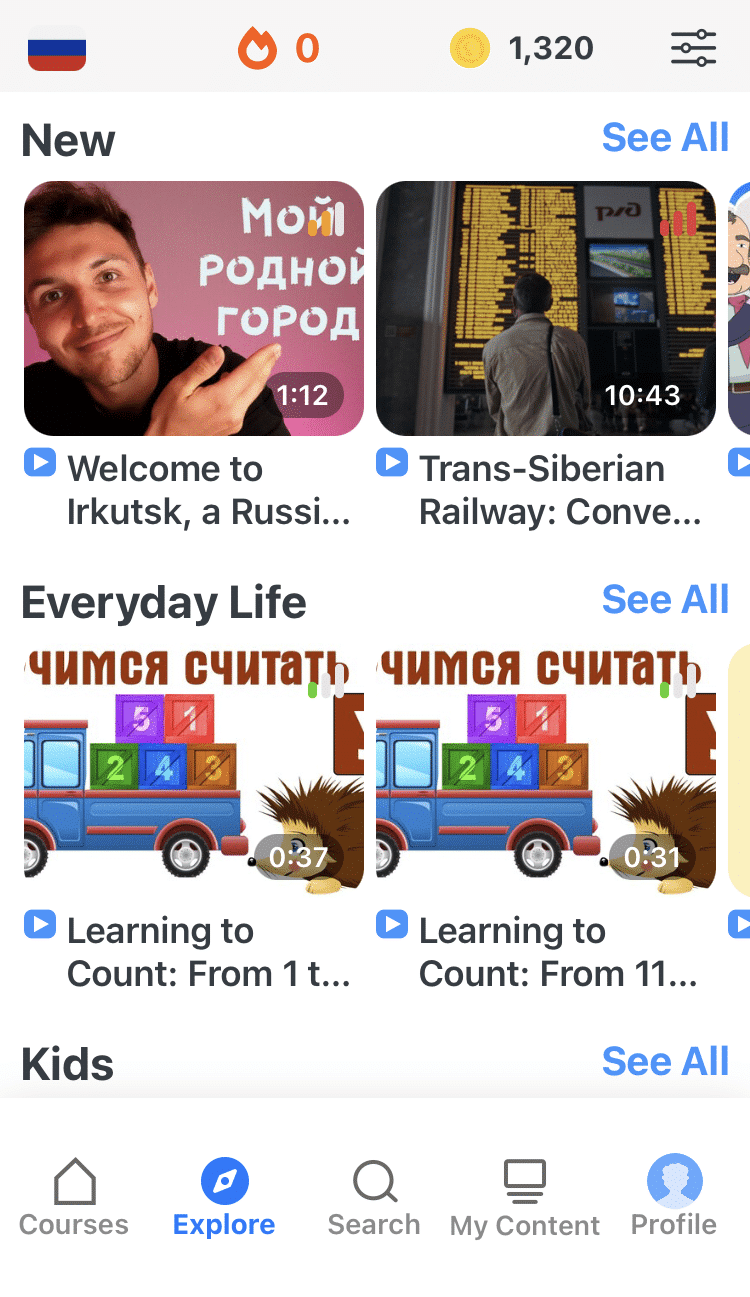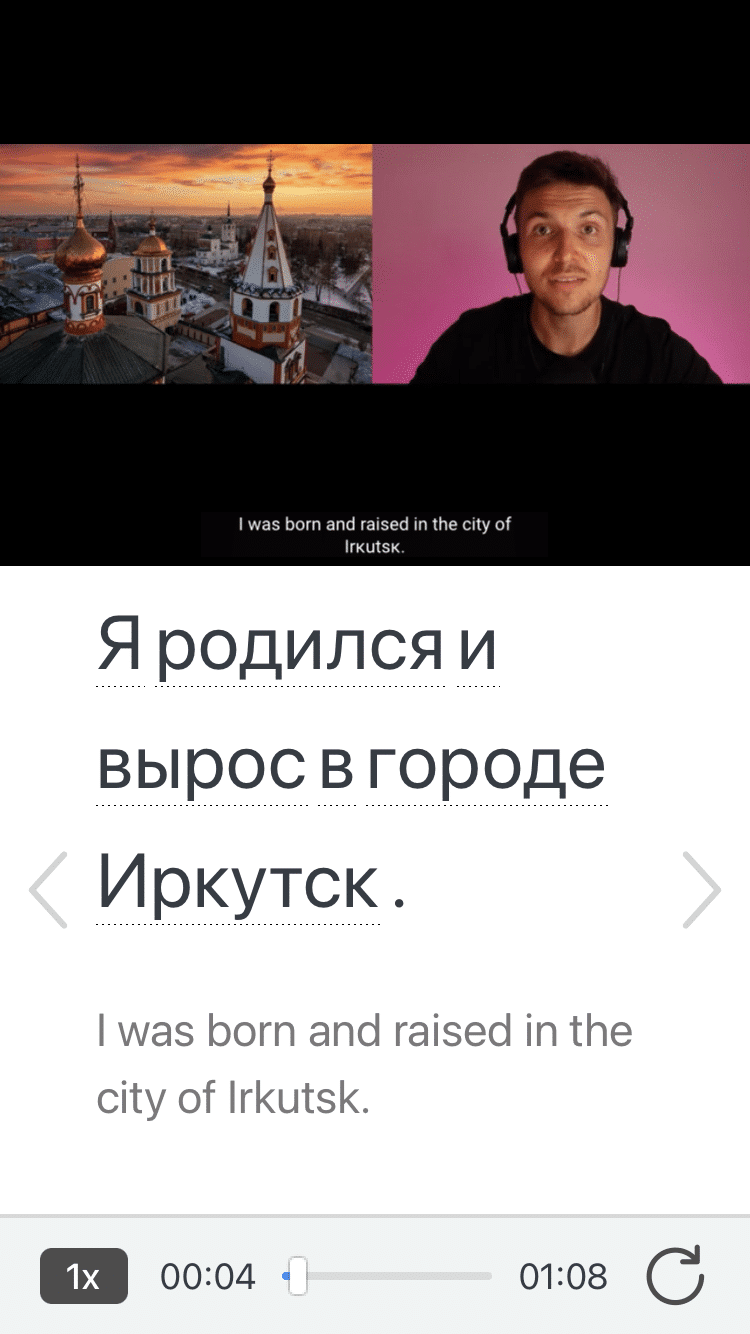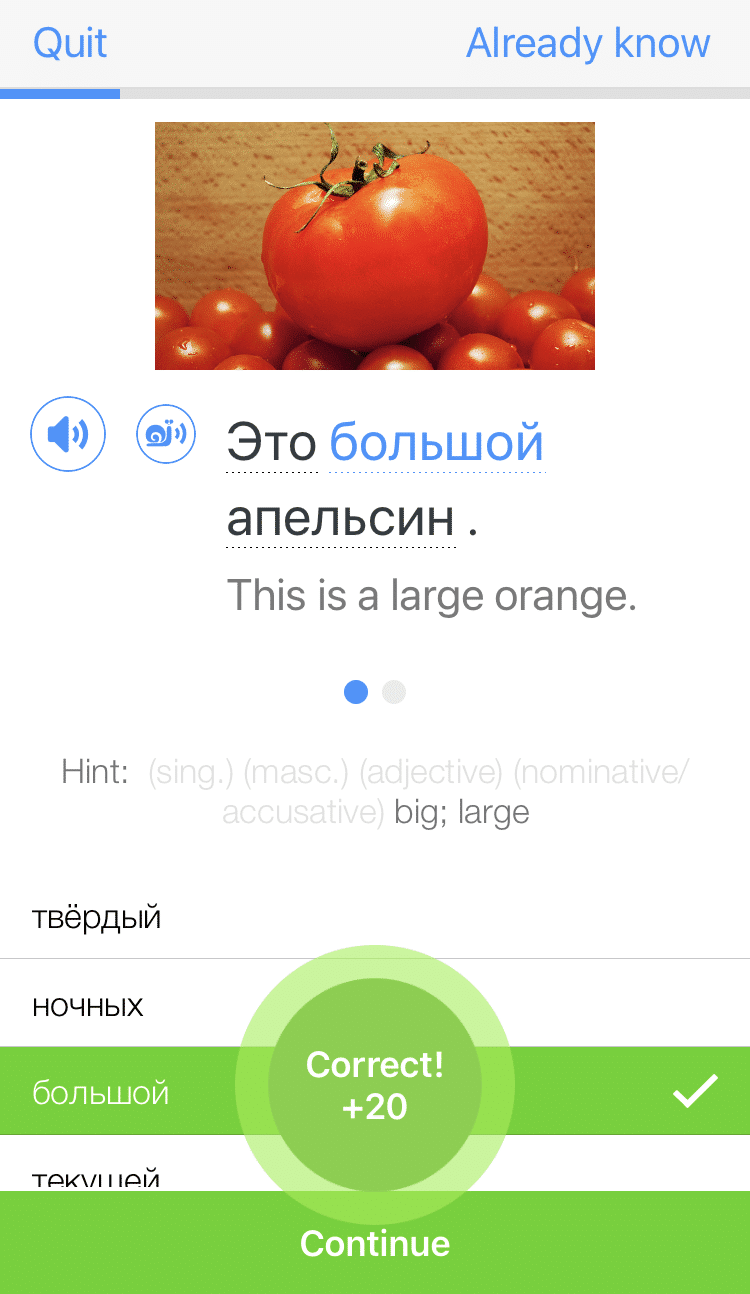
25 Russian Prepositions
Prepositions are small words that play a big role in relaying a message.
They’re used to express spatial or temporal relationships between objects or people. Without them, it can be hard to understand the full meaning of a sentence.
In this post, I’m going to teach you about Russian prepositions. And before you’re finished, you’ll have 25 new prepositions under your belt.
Contents
- Summary of Important Russian Prepositions
- Prepositions Used with the Prepositional Case
- Prepositions Used with the Accusative Case
- Prepositions Used with the Dative Case
- Prepositions Used with the Instrumental Case
- Prepositions Used with the Genitive Case
- Types of Russian Prepositions
- And One More Thing...
Download: This blog post is available as a convenient and portable PDF that you can take anywhere. Click here to get a copy. (Download)
Summary of Important Russian Prepositions
Here’s a summary of essential Russian prepositions you should know:
| English | Example Sentence | |
|---|---|---|
| В | In, at | Я живу в Москве. (I live in Moscow.) |
| To | Я иду в магазин. (I am going to the store.) | |
| Нa | On, at, in | Книга на столе. (The book is on the table.) |
| To | Она идет на работу. (She is going to work.) | |
| O | About | Они говорят о музыке. (They talk about music.) |
| Через | Across, through, over | Он пошел через мост. (He went across the bridge.) |
| За | Behind, beyond | Он за домом. (He is behind the house.) |
| К | To, toward | Она идет к магазину. (She is going to the store.) |
| По | Along, over, on | Они гуляют по парку. (They are walking around the park.) |
| Перед | Before, in front of | Он стоит перед зданием. (He stands in front of the building.) |
| Благодаря | Thanks to | Благодаря вам, все получилось. (Thanks to you, everything worked out.) |
| Согласно | According to | Согласно правилам, это невозможно. (According to the rules, this is not possible.) |
| С | With | Она танцует с другом. (She is dancing with a friend.) |
| From, down from | Он пришел с рынка. (He came from the market.) | |
| Между | Between, among | Стол стоит между стульями. (The table is between the chairs.) |
| Над | Over, above | Картина висит над столом. (The picture hangs over the table.) |
| Под | Under, beneath | Кошка лежит под столом. (The cat lies under the table.) |
| У | By, near, at | Она у окна. (She is by the window.) |
| Без | Without | Я пью чай без сахара. (I drink tea without sugar.) |
| От | From | Он пришел от врача. (He came from the doctor.) |
| Из | From, out of | Я из России. (I am from Russia.) |
| Для | For, for the sake of | Это подарок для тебя. (This is a gift for you.) |
| После | After | Он придет после обеда. (He will come after lunch.) |
| До | Until, before, as far as | Я буду здесь до пяти часов. (I will be here until five.) |
Russian has six cases, including the prepositional case, and there are actually dozens of prepositions used across different cases!
One of the best ways to perfect your prepositions is by hearing them used in Russian movies, songs and TV shows.
FluentU takes authentic videos—like music videos, movie trailers, news and inspiring talks—and turns them into personalized language learning lessons. You can try FluentU for free for 2 weeks. Check out the website or download the iOS app or Android app. P.S. Click here to take advantage of our current sale! (Expires at the end of this month.)
Now, let’s go through these prepositions by case in more detail:
Prepositions Used with the Prepositional Case
There are five prepositions used with prepositional case nouns, but until you reach a more advanced level, it’s best to focus on only three.
The first two prepositions—в (in) and на (on)—are both used to show location. Frequently, в (in) and на (on) are used to answer the question Где? (Where?) but it’s important to understand the subtle difference between the two.
https://www.youtube.com/watch?v=fuZbYiPyDLo
B — in (at)
If you were to ask someone, Где ты живёшь? (Where do you live?) their response may be:
Я живу в Москве. — I live in Moscow.
Or perhaps…
Где ты смотрел фильм? — Where did you watch the movie?
В кинотеатре. — In (at) the theatre.
Keep in mind that В is used when describing a defined location or enclosed structure. For instance, В is used in the case of countries and cities/towns because there are established borders (в России — in Russia, в Санкт-Петербурге — in St. Petersburg).
It’s also used for distinct natural environments (в пустыне — in the desert) and for covered and walled buildings (в школе — in school).
Hа — on (at, in)
Hа is the preposition used to indicate a person or thing is on a surface, in an open space or at an event.
For example:
Книга на столе. — The book is on the desk.
Картина на стене. — The picture is on the wall.
Анна на выставке весь день. — Anna is at the exhibition all day.
In terms of geography, HA is used in certain instances instead of B.
Notably, HA is the preposition for:
- islands and peninsulas (на Гавайских островах — on Hawaii)
- points of the compass (на западе — in the west)
- places that are outside (на площади — in the square, на Арбате- in the Arbat)
- open-air buildings (на стадионе — in the stadium)
- historically public and exposed spaces (на почте — at the post office, на станции- at the station).
O — about
The third preposition used with prepositional case nouns is O, which means “about.”
For example:
Мы говорили о новостях. — We talked about the news.
О чём ты мечтал? — What were you dreaming about?
Prepositions Used with the Accusative Case
While the prepositional case uses в and на to answer the question Где?, the accusative case uses the same two prepositions to answer the question Куда? (Where to?) and frequently involves a verb of motion.
The same rules apply as in the prepositional case with regard to whether в or на is used.
B — to
This time, the word B means “to” instead of “in” or “at.”
For example:
…в Москву (to Moscow).
…в Россию (to Russia).
…в театр (to the theatre).
…в школу (to school).
Hа — to
When used with the accusative case, Hа means “to.”
…на запад (to the west).
…на Гавайи (to Hawaii).
…на площадь (to the square).
…на вокзал (to the station).
…на стадион (to the stadium).
Через — across, through, over
Мы живём через улицу. — We live across the street.
Заяц быстро бежал через лес. — The rabbit ran through the forest fast.
Дети перелезли через забор. — The children climbed over the fence.
За — (to) behind, beyond
За in the accusative case is paired with a verb of motion to describe a direction of movement, with the sense of going “behind” or “beyond.”
Он переехал за реку. — He has moved across the river.
Собака прошла за угол и ждала девочку. — The dog went behind (around) the corner and waited for the girl.
Prepositions Used with the Dative Case
There’s one additional preposition used to answer the question Куда? which is used with the dative case:
К — to, toward (a person)
While в and на are used with the accusative to show the direction of movement to a place, к is used with the dative to show movement to a person, someone’s home or a place or building (without going inside).
Сегодня вечером мы пойдём к друзьям. — This evening we are going to (see) our friends.
Она пошла к Сергею. — She went to Sergei’s (place/house).
Водитель подъехал к дому. — The driver drove up to the house.
По — along, over, on, around (about)
Similar to к, по is used to demonstrate a physical movement, typically on or along a surface.
Дети бежали по улице. — The children ran along the street.
Корабль плывёт по реке. — The ship is sailing down the river.
Alternatively, по can be translated as “around” or “about” when talking about a very large area.
Она путешествовала по миру четыре месяца. — She travelled around the world for four months.
Она бегает по парку на выходных. — She runs around the park on the weekend.
Благодаря — thanks to
Благодаря can be used to express appreciation, acknowledge someone/something or state that a result was due to someone or an intervention of some kind.
Благодаря врачам, она выжила. — Thanks to the doctors, she survived.
Благодаря годам обучения, он поступил в университет. — Thanks to years of study, he was admitted to university.
Согласно — according to
Our final preposition in the dative case is Согласно.
Согласно отцу, Павел гений! — According to father, Pavel is a genius!
Согласно статье, экономика ужасна. — According to the article, the economy is terrible.
Prepositions Used with the Instrumental Case
С — with
С is the most common preposition used with instrumental case nouns because people often want to explain with whom or what they’re doing something.
Мы с мужем купили новый дом! — My husband and I (Literally: We with husband) bought a new house!
Я пью чай с лимоном. — I drink tea with lemon.
As all Russian learners quickly discover, there are seemingly countless versions of verbs of motion. There are also plenty of prepositions to denote movement, along with location in general.
Между — between, among
This preposition can be used to show something or someone is physically positioned between two objects or among multiple objects/people.
For instance:
Она поделила работу между участниками. — She distributed the work among the participants.
Мяч в саду между двумя домами. — The ball is in the garden between the two houses.
Alternatively, между can be used in an abstract sense.
Это был секрет между членами семьи. — It was a secret among the family members.
Пара обменялась взглядами между собой. — The couple exchanged a glance between themselves.
Перед — before, in front of
Перед can be used with or without a verb of motion and showcases that something is physically in front of or located before another person or object.
Машина припаркована перед домом. — The car is parked in front of the house.
Ученик встал перед классом и произнёс речь. — The student stood before (in front of) the class and delivered the speech.
Дети идут по проходу перед невестой. — The children walk down the aisle before (in front of) the bride.
Над — over, above
Similar to перед, над can be used with or without a verb of motion and most commonly expresses a spatial relationship in which an object is over or above another.
Самолёт громко и быстро летел над городом. — The airplane flew over the city loudly and quickly.
Портрет королевы висит на стене над камином в гостиной. — The queen’s portrait hangs on the wall over the fireplace in the living room.
Под — under, beneath
Под means “under” or “beneath” and is used as in the following sentences.
Мне нравится спать под звёздами. — I like to sleep under the stars.
Собака часто лежит под крыльцом летом. — The dog often lies under the porch during the summer.
Take Note! If a verb of motion is used and “under” is the destination of that motion, под is used with an accusative case noun:
Он положил сумку под стол. — He put the bag under the table.
Лестница ведёт под землю. — The stairs lead underground.
За — behind, beyond
За with the instrumental case means “behind or beyond.” You’re describing where an object or someone is:
Кот за диваном. — The cat is behind the sofa.
Парк находится за рекой. — The park is located beyond the river.
Like Под, this shouldn’t be combined with a verb of motion in the instrumental case because it’s only for static locations. If you want to describe movement, as in going behind something, then you would use the accusative case instead.
Prepositions Used with the Genitive Case
As misleading as the name is, the prepositional case does not use prepositions en masse. Instead, the genitive case uses the most prepositions—more than 30!
Many of the prepositions used with the genitive case are infrequently utilized, so don’t feel like you need to learn them all. But here are several you simply can’t live without!
У — to have; by, near, at
One of the first grammatical structures Russian learners master is the phrase У меня есть (I have).
Извините пожалуйста, у меня есть вопрос. — Excuse me, I have a question.
У меня есть новое платье, которое я хочу показать вам. — I have a new dress that I want to show you.
Similarly, у can be used to say at (someone’s house). For example:
У дома врача стоит новая машина. — There is a new car at the doctor’s house.
У is also used to say something is near or by something or someone.
Завтра мы пообедаем у директора. — Tomorrow we will have lunch at the director’s (house).
Студенты стоят у экрана. — The students are standing by/near the screen.
Без — without
Я пью кофе без сахара и молока. — I drink coffee without sugar or milk.
Мы уехали в отпуск без детей. — We went on vacation without the children.
While в, на and к show movement toward, от, из and с are used with the genitive to indicate the origin and show movement from.
However, it’s important to note that the next three prepositions are slightly different.
От — (away) from
От can be used to show someone or something is moving away from a person or location.
Я пришёл сюда от доктора. — I came here from the doctor’s (office).
Отойди от дороги! — Get away from the road!
Из — (out) from
When using из, just remember that a person or object is moving out from a place.
For example:
Вор бежал из дома. — The thief ran from the house.
Самолёт летел из Москвы в Санкт-Петербург. — The plane flew from Moscow to Saint Petersburg.
С — from, down from
Она идёт с концерта. — She’s coming from a concert.
Я взял книги с полки. — I took the books down from the shelf.
It can be confusing at first to determine which form of “from” should be used. One easy way to keep от, из and с straight is by memorizing them with the corresponding to/toward vocabulary as in the table below!
| Usage | Russian Preposition |
|---|---|
| To/from an enclosed building, country/town with defined borders | B + accusative |
| Из + genitive | |
| To/from a surface, event, open area | HA + accusative |
| C + genitive | |
| To/from a person or a building if you are near but not inside it | К + dative |
| От + genitive |
Для — for, for the sake of, for the benefit of
This preposition is used to express that something benefits someone or something else.
Она делает всё для своих детей. — She does everything for her children.
Эта песня для моей жены. — This song is for my wife.
Этот шкаф для фарфора. — This cabinet is for the china.
После — after
This preposition is used with the genitive case to convey temporal origin.
Ты должен закончить домашнее задание после ужина. — You must finish your homework after dinner.
После аварии я больше никогда не хочу выходить из дома! — After the accident, I never want to leave home again!
До — until, before, as far as
Like После, До is used to convey temporal origin, but from the opposite side of the spectrum.
For example:
Ты можешь играть на улице до обеда. — You can play outside until dinner.
The preposition до may also be used in a physical sense.
Они добрались до Киева, когда начался снег. — They reached Kiev as the snow began to fall.
And finally, since you’re now familiar with с and до, there’s a common time expression you’ll find useful. It’s the structure “from…until!”
Он работал с 9 до 5 каждый день в течение 40 лет. — He worked from nine to five every day for 40 years.
Встреча проходит с рассвета до заката. — The meeting takes place from dawn to dusk.
Types of Russian Prepositions
There are four different classifications of prepositions:
- Original prepositions. The oldest ones in the language, most of the prepositions addressed in this post fall into this category.
- Prepositions formed from verbs. Two verbal prepositions (благодаря and согласно) are addressed above.
- Prepositions formed from nouns.
- Adverbial prepositions. Many of these are still used as adverbs!
As you can see from the list, Russian prepositions can be diverse! The ones we’ve listed are the most important, though.
Because of this, it’s useful to have a solid grasp of each case in Russian and also learn similar prepositions together. For example, “в” and “на” can both mean “in” or “on” depending on what they’re referring to.
All in all, there are plenty of prepositions to choose from, and Russians like to use them with all the cases. It may take you a while to master them, but if you get comfortable with these 25 you’ll be well on your way.
Download: This blog post is available as a convenient and portable PDF that you can take anywhere. Click here to get a copy. (Download)
If you love learning Russian and want to immerse yourself with authentic materials from Russia, then I should also tell you more about FluentU.
FluentU naturally and gradually eases you into learning the Russian language and culture. You'll learn real Russian as it's spoken by real Russian people!
FluentU has a very broad range of contemporary videos. Just a quick look will give you an idea of the variety of Russian-language content available on FluentU:
FluentU makes these native Russian videos approachable through interactive transcripts. Tap on any word to look it up instantly.
Access a complete interactive transcript of every video under the Dialogue tab. Easily review words and phrases with audio under Vocab.
All definitions have multiple examples, and they're written for Russian learners like you. Tap to add words you'd like to review to a vocab list.
And FluentU has a learn mode which turns every video into a language learning lesson. You can always swipe left or right to see more examples.
The best part? FluentU keeps track of your vocabulary, and gives you extra practice with difficult words. It'll even remind you when it’s time to review what you’ve learned. You'll have a 100% personalized experience.
Start using the FluentU website on your computer or tablet or, better yet, download the FluentU app from the iTunes or Google Play store. Click here to take advantage of our current sale! (Expires at the end of this month.)
And One More Thing...







